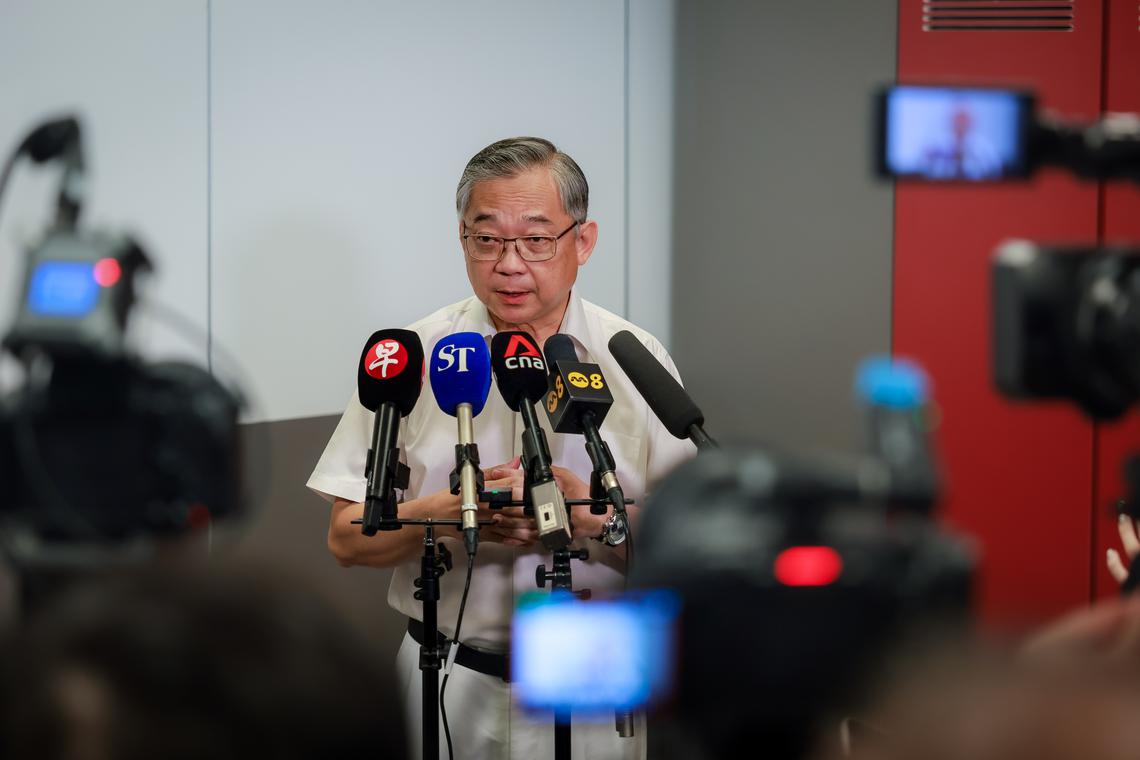SINGAPORE – The US wants to explore “creative solutions” to strengthen its trade relations with and facilitate critical exports from Singapore, as the Republic is an important trading partner and friend, said Deputy Prime Minister Gan Kim Yong.
Speaking to the media at a doorstop interview on April 27, DPM Gan, who is also Minister for Trade and Industry, said he had a call with US Secretary of Commerce Howard Lutnick on April 25, in which he explained to Mr Lutnick the nature of bilateral trade and business between Singapore and the US.
Singapore is also negotiating concessions to facilitate the export of pharmaceuticals to the United States, said DPM Gan.
The negotiations also touched on ensuring that companies in Singapore have access to high-end AI chips from the US – a critical technology used in areas such as data centres here.
Mr Lutnick had said that the 10 per cent baseline tariff imposed on items imported from Singapore and other countries into the US is not likely to be up for negotiation, said DPM Gan.
However, Mr Lutnick also said “he would like to explore creative solutions to see how we can strengthen bilateral trade between Singapore and US, particularly with regard to critical exports from Singapore to US – exports that are important to us”, said DPM Gan.
DPM Gan cited the US’s intention to impose sectoral tariffs on certain products it imports, such as pharmaceuticals, as something of great importance to Singapore.
Pharmaceuticals currently make up more than 10 per cent of the Republic’s exports to the US, he said, and it is important for Singapore to seek concessions so that pharmaceuticals can continue to be exported to the US.
On access to high-end AI chips for Singapore companies, DPM Gan noted that Mr Lutnick “said that from his perspective, he’s concerned about the export controls of these chips, not just to Singapore, but generally”.
“Therefore we took the opportunity to explain to Secretary Lutnick about Singapore’s export control system and how we have been working together with the US counterparts in this area, to the extent that our law permits,” said DPM Gan, who added that Singapore takes a very serious view on companies that violate the country’s rules and regulations.
“We also do not condone companies that take advantage of their presence in Singapore to undermine the export controls imposed by other countries,” said DPM Gan.
Mr Gan said that Mr Lutnick is satisfied with Singapore’s export control system.
“On the basis of trust, he’s prepared to look at how Singapore can work with US to strengthen export controls for these high-end AI chips to ensure that they end up with designated, authorised, end users,” said DPM Gan, who added that Mr Lutnick suggested that the two countries can work together to ensure Singapore is assured of continued supply and access to the chips.
Mr Gan said that access to such chips is critical for high-end computing businesses.
While progress has been made in discussions with the US, said Mr Gan, a lot of negotiations have still to take place before a deal can be struck.
Mr Gan said that a timeline for discussions has not been set, but added that Mr Lutnick’s priority is to “keep it simple and see whether we can resolve discussions very quickly”.
“From Singapore’s perspective, of course, because we are a very small country, that’s also an advantage for us, because we can move very quickly, and we’re also very nimble,” he said.
His comments come a day after Prime Minister Lawrence Wong underscored the bilateral trust between the US and Singapore at a PAP rally for Chua Chu Kang GRC.
PM Wong said the US Commerce Secretary conveyed to DPM Gan that they had confidence in Singapore.
“Trust Singapore, trust Gan Kim Yong, because of what he represents – the full faith and credit of the Singapore Government. This system that we have built together for the last 60 years,” said PM Wong at the rally on April 26.
DPM Gan, who chairs the Singapore Economic Resilience Taskforce, said that its members have worked out and distributed a list of possible initiatives on helping Singapore workers and businesses navigate the tariff uncertainties to panel members, who will evaluate them and seek feedback from trade associations.
The task force includes four other Cabinet ministers and the heads of the Singapore Business Federation, the National Trades Union Congress and the Singapore National Employers Federation.
DPM Gan said that the measures are grouped into three categories – supporting companies impacted immediately by the tariffs, helping workers to retain their jobs, and helping companies, especially those impacted by changes in supply chains and the movement of manufacturing bases, to transform in the long-term.
Ongoing engagements and discussions on the possible initiatives will be held in confidence so as not to impact business competitiveness, he said.
Noting that jobs will be affected by the ongoing tariff war and that there are signs of a slowdown in hiring, DPM Gan said the Government is engaging with business across various sectors, so that it can tailor support schemes to meet sector-specific needs.
DPM Gan’s call with Mr Lutnick comes after he had earlier discussed the tariffs and their impact on trade with US Trade Representative Jamieson Greer on April 15.
Ambassador Greer explained the US’ concern over its overall trade deficit in goods, as well as the US’ priority to strengthen its domestic manufacturing base,” DPM Gan wrote in a LinkedIn post.
“He also acknowledged Singapore’s importance as an economic partner and the US’ trade surplus with Singapore, even as we are subject to the 10 per cent baseline tariff.”
Join ST’s WhatsApp Channel and get the latest news and must-reads.

